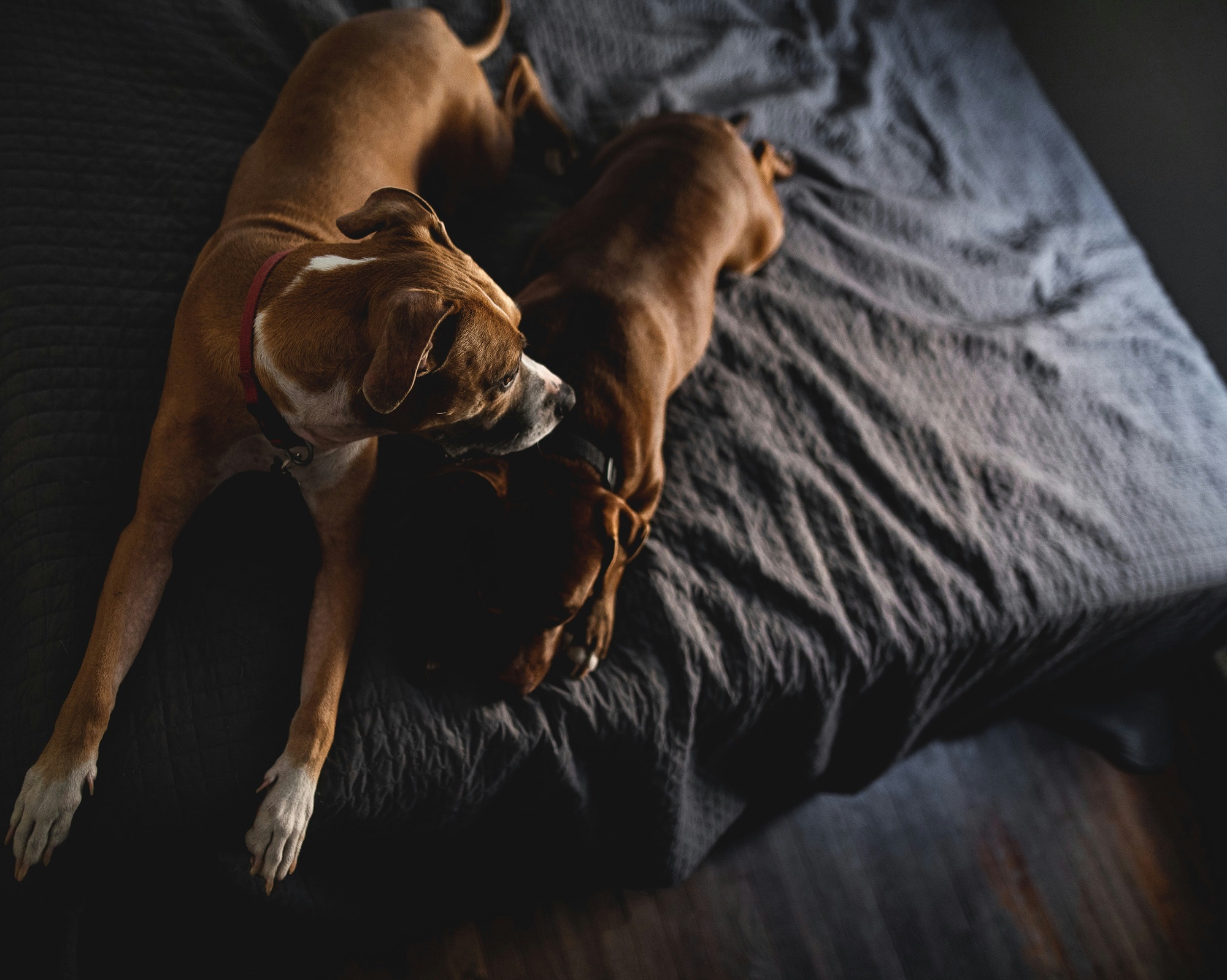For many dog owners, allowing their beloved pets to sleep in bed is an easy decision. After all, dogs provide companionship, warmth, and comfort. However, while the idea of curling up with your furry friend may seem cozy, there are several reasons why sharing your bed with your dog might not be the best idea. From hygiene concerns to potential sleep disruptions, there are a variety of factors that can make sleeping with your dog more problematic than comforting.
Although it’s tempting to let your dog snuggle under the covers, sleeping together may actually be doing more harm than good for both you and your pet. In this guide, we’ll explore 13 compelling reasons why allowing your dog in bed might not be the healthiest choice, especially if you’re prioritizing a good night’s sleep and overall well-being.
1. Disrupted Sleep Quality
One of the biggest downsides to sharing your bed with your dog is that it can disrupt your sleep quality. Even if your dog is well-behaved, their movements during the night can interfere with your ability to get deep, restorative sleep. Dogs tend to shift around, kick, scratch, or even snore, all of which can wake you up or prevent you from reaching the deep sleep stages necessary for optimal rest.
Even small dogs can take up more space than expected, leaving you feeling cramped or uncomfortable. As a result, you may toss and turn, leading to fragmented sleep. Over time, disrupted sleep can leave you feeling fatigued, irritable, and less focused during the day. Chronic sleep disturbances can also lead to more serious health problems, such as increased stress levels, weakened immune function, and difficulty concentrating.
While your dog may enjoy the closeness, it’s important to recognize that their presence could be preventing you from achieving the quality rest you need. For optimal health and well-being, it’s essential to maintain a regular, uninterrupted sleep schedule, which can be difficult if your pet is constantly moving or making noise during the night.
2. Increased Risk of Allergies
Even if you don’t suffer from pet allergies, having your dog in bed can increase your exposure to allergens, including pet dander, hair, and saliva. Dogs naturally shed dander, which consists of tiny, flaky skin particles that can trigger allergic reactions in sensitive individuals. Allowing your dog to sleep on your bed means these allergens will accumulate on your pillows, sheets, and blankets.
Additionally, dogs often bring in outdoor allergens like pollen, dust, or grass from outside, especially if they spend time outdoors. These allergens can cling to their fur and paws and make their way into your bed, exacerbating allergy symptoms. Over time, this buildup of allergens can cause you to experience nasal congestion, sneezing, itchy eyes, and even worsen preexisting asthma symptoms.
Even if you think you’re not prone to allergies, consistent exposure to pet dander and other allergens can eventually lead to sensitivities or more severe allergic reactions. Keeping your dog off the bed is a smart way to minimize your exposure to potential allergens and ensure a healthier, allergen-free sleep environment.
3. Hygiene and Cleanliness Concerns
No matter how clean your dog is, allowing them to sleep in your bed can pose significant hygiene issues. Dogs explore the world with their paws and fur, meaning they often track dirt, mud, and other debris into the house. Even after a bath, your dog can still carry bacteria and germs that can easily transfer to your bedding.
Dogs also shed fur and skin cells, which can lead to your bed becoming a breeding ground for bacteria, mites, and other microorganisms. This is particularly concerning if your dog has been playing outside or rolling around in the grass, as they can easily bring in pests like fleas or ticks.
If your dog isn’t fully house-trained, there’s also the risk of accidents happening in the bed. This can lead to unpleasant odors, stains, and a lot of extra laundry. Overall, keeping your dog out of your bed helps maintain a cleaner, more hygienic sleeping environment and reduces the risk of exposure to germs, parasites, and pests.
4. Potential for Aggressive Behavior
While most dogs are friendly and affectionate, some dogs may develop territorial or aggressive behavior if they’re allowed to sleep in bed with their owners. This is especially true for dominant or protective breeds that may view the bed as their “territory.” If your dog begins to associate your bed with a sense of ownership, they may become possessive of the space and act aggressively towards others, including family members or partners, who try to get into bed.
This territorial behavior can manifest in growling, barking, or even snapping at anyone who attempts to join or approach the bed. Over time, this can create tension within the household and lead to behavioral issues that are difficult to manage.
To prevent these problems, it’s important to establish clear boundaries from the beginning. Providing your dog with their own comfortable sleeping space, such as a dog bed or crate, helps reinforce the idea that the bed is for humans, while still allowing them to feel safe and secure.
5. Increased Anxiety in Dogs
Allowing your dog to sleep in bed with you may seem like a way to comfort them, but it can actually increase feelings of separation anxiety in some pets. When dogs become accustomed to always being near their owners, especially during sleep, they may struggle with feelings of anxiety or distress when left alone. This can make it more difficult for them to cope with being separated from you during the day or when you’re not at home.
Dogs that suffer from separation anxiety may display behaviors such as barking, whining, pacing, or destructive tendencies when left alone. Allowing your dog to sleep independently, rather than in your bed, can help them develop a sense of security and confidence, reducing their anxiety when they’re away from you.
Creating a consistent bedtime routine where your dog has their own dedicated sleeping area can help alleviate anxiety and promote healthier, more balanced behavior. Your dog will learn that it’s okay to be alone, even for extended periods, which will improve their overall emotional well-being.
6. Difficulty Maintaining Proper Training
Sleeping with your dog in bed can undermine efforts to maintain proper training and reinforce behavioral expectations. Dogs thrive on structure and consistency, and allowing them to sleep in your bed can blur the lines between acceptable and unacceptable behavior. For example, a dog that is permitted to sleep in your bed may begin to expect other privileges, such as jumping on furniture or ignoring commands to stay off certain areas of the house.
In addition, dogs that are accustomed to sleeping in bed may resist sleeping in their own designated space, such as a dog bed or crate. This can make it more difficult to train them to sleep independently or adhere to house rules. By establishing clear boundaries from the beginning, such as designating a specific sleeping area for your dog, you reinforce their training and help them understand their place within the household hierarchy.
Training your dog to sleep in their own space also promotes a more disciplined, well-behaved pet, reducing the chances of behavioral issues like territorial aggression or disobedience. A consistent approach to bedtime routines can make a big difference in how well your dog responds to training and boundaries.
7. Possibility of Injury
Letting your dog sleep in bed with you can also increase the risk of accidental injury to both you and your pet. If your dog is small, they may be vulnerable to being rolled on or accidentally kicked while you sleep. Larger dogs, on the other hand, can pose a risk of unintentionally causing injury to you if they move suddenly, stretch out, or jostle you in the middle of the night.
Additionally, if your dog has difficulty jumping on or off the bed, they could suffer from joint or back injuries from repeated jumping, especially if they’re older or have mobility issues. For dogs with arthritis or other physical limitations, getting on and off the bed can strain their joints and lead to long-term discomfort or injury.
To avoid potential injuries, it’s safer to provide your dog with their own sleeping space, such as a dog bed on the floor. This ensures that both you and your pet remain safe and comfortable throughout the night.
8. Impact on Your Relationship
Sleeping with your dog in bed can unintentionally strain your relationship with your partner. While you might enjoy the companionship of having your dog close by, your partner may feel differently, especially if the dog’s movements, snoring, or presence interrupts their sleep. This can lead to frustration and resentment, particularly if one person in the relationship is more accommodating to the dog’s presence than the other.
Additionally, having a dog in bed can reduce intimacy between partners. Sharing the bed with a pet may create less space for you and your partner to comfortably cuddle, talk, or enjoy quiet moments together. Over time, this can impact the closeness and emotional connection in your relationship.
Establishing clear boundaries and finding a compromise that works for both you and your partner is important for maintaining a healthy relationship. If your partner prefers the dog to sleep elsewhere, consider providing your pet with a cozy alternative, like a dog bed or crate, so that everyone in the household can get the rest they need.
9. Disturbed Sleep from Nocturnal Behavior
Dogs are polyphasic sleepers, meaning they wake up several times throughout the night and day. While humans generally sleep in longer, uninterrupted periods, dogs tend to sleep for shorter intervals and wake up to adjust their position, lick themselves, scratch, or even walk around. This difference in sleep patterns can lead to disrupted sleep for dog owners who share their bed with their pets.
If your dog wakes up frequently during the night, even just to shift around or make noise, it can prevent you from entering or staying in the deeper stages of sleep that are crucial for rest and recovery. This interrupted sleep can leave you feeling groggy, fatigued, and less focused during the day. Over time, chronic sleep disturbances can lead to more serious health issues, including weakened immunity, increased stress, and mood disorders.
While you may want to accommodate your dog’s sleep habits, it’s important to prioritize your own sleep quality. By providing your dog with their own sleeping area, you can minimize these disturbances and enjoy a more restful, uninterrupted night of sleep.
10. Spread of Parasites
Even the cleanest dogs can occasionally carry parasites, such as fleas or ticks, which can easily transfer from their fur to your bedding. Allowing your dog to sleep in your bed increases the likelihood of these parasites spreading, not only to you but also throughout your home. Fleas and ticks are not only annoying but can also transmit diseases, making them a serious health concern for both humans and pets.
Regular grooming, flea treatments, and tick prevention are essential for keeping your dog healthy and parasite-free, but these measures aren’t foolproof. By keeping your dog off your bed, you reduce the risk of coming into contact with parasites and minimize the chances of infestation in your home.
If you live in an area where fleas or ticks are common, or if your dog spends a lot of time outdoors, it’s especially important to keep them out of your bed to protect both your health and the cleanliness of your sleeping environment.
11. Potential for Bed Damage
Dogs, especially larger or more active breeds, can cause unintentional damage to your bed. From scratching the sheets to tearing the mattress, a dog’s natural behaviors can take a toll on your bedding and furniture. Even well-behaved dogs might accidentally scratch or rip the fabric when they get excited or try to make themselves comfortable.
Over time, the wear and tear from your dog’s claws, fur, and movements can lead to expensive repairs or the need to replace your bedding more frequently. Additionally, if your dog has a habit of drooling or shedding excessively, your bed can become stained, requiring more frequent cleaning and potentially damaging the fabric.
By providing your dog with their own designated sleeping area, you can protect your bed from damage while still ensuring that your pet has a cozy and comfortable space to rest. This will save you money in the long run and help maintain the longevity of your bedding.
12. Overheating
Dogs are naturally warm-blooded, and having them in bed with you can cause overheating, especially if you sleep with blankets or heavy bedding. Dogs tend to generate a lot of body heat, and if you’re sharing a small space with your pet, it can quickly become uncomfortable, causing you to wake up feeling hot, sweaty, or restless.
Overheating during sleep can lead to poor sleep quality and make it difficult to fall back asleep after waking. This is particularly problematic for people who are already prone to night sweats or those who live in warmer climates where it’s harder to maintain a cool sleeping environment.
To prevent overheating, consider giving your dog their own bed nearby, where they can still feel close to you without contributing to the excess warmth in your bed. This way, both you and your dog can sleep comfortably without overheating or disrupting your rest.
13. Difficulty Breaking the Habit
Once you allow your dog to sleep in your bed, it can be challenging to break the habit. Dogs are creatures of routine, and if they become accustomed to sleeping in your bed, they may resist being moved to their own sleeping space later on. This can create challenges if you decide to change your sleeping arrangements or if circumstances arise where your dog can no longer sleep in your bed, such as health issues or a new family member arriving.
Breaking this habit may involve retraining your dog to sleep in a crate or dog bed, which can take time and patience. Dogs may initially protest or become anxious when they’re no longer allowed in the bed, leading to whining, barking, or destructive behavior. To avoid this struggle, it’s best to establish clear boundaries from the beginning and provide your dog with a consistent, independent sleeping area.
By setting the expectation early on that your bed is for humans, you can prevent behavioral issues and ensure that your dog is comfortable and content in their own space. This also helps maintain a sense of structure and discipline in your dog’s routine, promoting better behavior overall.
While it may be tempting to let your dog share your bed, the potential downsides—from disrupted sleep and hygiene concerns to behavioral issues and damage to your bedding—can outweigh the benefits. By creating a designated sleeping space for your dog, you not only protect your sleep quality and health but also reinforce positive behaviors in your pet. Prioritizing separate sleeping arrangements can lead to better rest, a cleaner living environment, and a healthier relationship with your furry companion.




